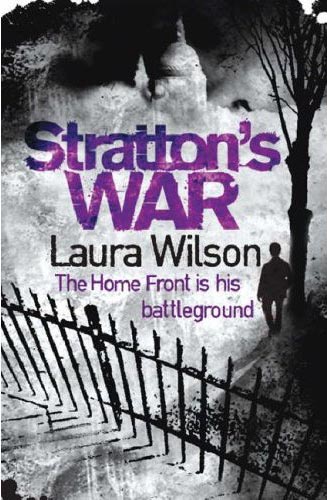
EURO CRIME
Reviews

Wilson, Laura - 'Stratton's War'
Trade Paperback: 320 pages (Jan. 2008) Publisher: Orion ISBN: 0752876244
STRATTON'S WAR is an excellent book: a fully rounded novel of London in the Blitz in the summer of 1940. There are two main protagonists, both outsiders as far as the Establishment is concerned - one is a professional policeman from the 'working' classes; and the other, of a socially higher class, is a woman. Each of these characters is the centre of their own story, and it is not until about two-thirds of the way through the book that they meet - and although they instinctively like each other, it is not until the end that they share a mutual awareness of their similarities, far stronger than their superficial differences, which bind them together.
In one of the book's two main stories, the titular DI Stratton attempts to keep law and order in a chaotic city, where buildings, even his own station, can be reduced to rubble overnight; where the black market and gangsters have plenty of opportunity to operate; and where the general chaos acts as an encouragement to looters and petty criminals, or just ordinary people, fed up at the sacrifices they are being forced to make for the 'war effort', to lash out.
The impetus for Stratton's story is the apparent suicide of a failed silent film actress who never made it into the talkies. Stratton does not believe that the death was accidental, so even though his bone-headed superiors want him off the case and onto higher-profile crimes, he continues to investigate on his own time. These events drive the plot, but Stratton's own story has considerable depth, not only in the character study of the man himself, but in his relationship with his wife, their evacuee children and her extended family, as well as the authentic background of the contemporary police force, conveying what it must have been like to try to carry out investigations, or indeed any 'normal' activity, in a time of war, when resources were scarce and a bomb could drop on you at any moment.
The second, equally compelling, story is one of spies and patriotism. Diana Cudlipp is unhappily married, stuck living with her awful mother-in-law while her husband is away fighting. She wangles a job at the War Office on the strength of her beauty and language skills, and is asked to infiltrate the Rights Club, a collection of upper-class Nazi sympathisers. She's very successful, being sensitive, intelligent and observant, yet quickly realises that a senior colleague, Sir Neville Apse, might be implicated. Diana's boss, "F-J" transfers her into a job in Apse's office, and Diana begins to uncover secrets that are obscure to her, but which are clearer to the modern reader - even though we are never quite sure what proportion of the clandestine goings-on concern the war, F-J's office politics, or the sexual proclivities of Apse and his associates.
Diana is bought into sharp focus for the reader via her all-too believable naivety and insecurity about personal relationships; she is manipulated by all the men she meets apart from Stratton. She's painfully aware that this is happening, and is a strong, independently minded character who has grown up considerably since her early marriage, but, in those pre-liberated times, she cannot break out of the straitjacket of society's expectations, stoically having to accept the rules of a male-dominated world.
I thoroughly enjoyed this book. The plotting is excellent, dovetailing perfectly with the excitingly tense World War Two background. The constant personal frustrations of Stratton and Diana, as the truths they separately uncover are suppressed for the "greater good" or for the war effort, or for the retrospectively quaint (but no doubt accurate) imperative to preserve the status quo of the class structure, make the book far deeper than a genre novel.
Part of the pleasure and poignancy of this book is the objectivity and frankness that this talented author can bring to bear on events of nearly 70 years ago. For 30 years or so after the war, novels of this type were still, on the whole, covered with a veneer of propaganda and, although exciting, were often too black-and-white to seem realistic or involving. Laura Wilson examines all the issues: social, sexual and political, with a clear-sightedness that provides real insight to the modern reader. This is an admirable novel, both as a good piece of historical crime fiction, but also as a social and emotionally telling commentary on the snapshot of time in which it is set.
Read another review of STRATTON'S WAR.
Maxine Clarke, England
August 2008
Details of the author's other books with links to reviews can be found on the Books page.
More European crime fiction reviews can be found on the Reviews page.